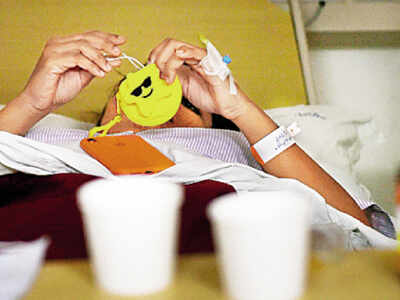
MUMBAI: Eleven kilos, 54 days and Rs 22 lakh. This was the total cost involved in getting 50-year-old Kalyan resident Minaz Baig back on her feet after fighting Covid-19 and its several complications.
While Juhu’s Nanavati Hospital completely waived off Baig’s bill, there was one price not factored here: Memories.
Baig, who weighed 84kg earlier and is now 73kg, remembers being rushed to the hospital on June 11. Her next memory is that of a nurse telling her it is July 8. “I thought I was in slumber for 24 hours and was shocked to hear so many days had passed,” said Baig, wife of a fast food vendor from Kalyan.
The average hospital stays for patients with Covid-19—the viral outbreak that has over the past five months changed the way Mumbaikars live and work —ranges from 15 to 21 days, depending on the severity of their symptoms.
But as Baig’s experience shows the ordeal can stretch much longer in some of the 1.3 lakh Covid patients in the city so far.
Consider Vasai-based grandmother Raji Nair (not her real name) who spent 46 days in the BMC-run Seven Hills Hospital in Andheri. She lost a son to Covid before being diagnosed with the condition herself and getting admitted with four of her family members.
Seven Hills dean Dr B Adsul remembers a patient who stayed for three months as the relatives he was visiting in Mumbai abandoned him. “We had to get social workers to help him travel back to Uttar Pradesh,” said Dr Adsul.
The problem with longer stays, as Nair’s grandson Ramith, who was admitted alongside her for 15 days, said is that the stress and uncertainly get multiplied too. “Apart from her health, we were also concerned as my 83-year-old grandmother only speaks Malayalam and doesn’t know how to use a mobile phone,” he said. On one occasion, her family said the nurses forgot to lock her IV drip and she bled profusely all over the bedsheet. Also, she was shifted to three different wards and developed urinary tract infection as no one remembered to change her catheter in over 40 days.
Clearly, the biggest problem with longer hospital stays is the threat of secondary bacterial or fungal infections. Dr Abdul Ansari, who heads the intensive care at Nanavati Hospital, said Baig was brought to the hospital in a critical state. “She had acute respiratory distress syndrome (ARDS) when she was brought here from a local Kalyan hospital,” he said.
Baig, who tested positive for the virus six times, needed all the medicines used for Covid ICU patients: Tocilizumab, Favipiravir and Remdesivir. “We would get calls from Nanavati Hospital three times a day, sometimes to ask if she could be started on a new medicine,” said her nephew Tariq Don.
It is the nature of this viral infection, Dr Ansari said, to lead to complications.
“If a patient gets admitted late, they have a high risk of developing cytokine storm (a complicated immune response from the body) and ARDS,” he said. If appropriate medicines are delayed, the patient’s condition could worsen and lead to organ failure as well. “In some patients, bleeding complications occur,’’ said the doctor.
On the 11th day of her hospitalization, Baig needed a tracheostomy, a medical procedure to create an opening in the neck for the windpipe to allow air to enter the lungs. Her creatinine shot up, indicating kidney problems. This was when the course of the then newly available drug, Remdesivir, was started.
As she slowly recovered enough to be weaned off the ventilator, she was diagnosed with a fungal infection that required her to be given some of the most powerful antibiotics. “She even developed a drug-resistant urinary tract infection a few days before discharge,” said Dr Ansari.
Baig, though, remembers her hospital stay fondly. “I couldn’t see the faces of the doctors or the nurses as they wore masks but I could recognize their voices. And they were very considerate to me,” she said.
Ramith, too, said barring the two incidents, the Seven Hills stay was fruitful. “The doctors would get irritated with our calls, but they healed my grandmother and she is able to walk again,” he added.
While Juhu’s Nanavati Hospital completely waived off Baig’s bill, there was one price not factored here: Memories.
Baig, who weighed 84kg earlier and is now 73kg, remembers being rushed to the hospital on June 11. Her next memory is that of a nurse telling her it is July 8. “I thought I was in slumber for 24 hours and was shocked to hear so many days had passed,” said Baig, wife of a fast food vendor from Kalyan.
The average hospital stays for patients with Covid-19—the viral outbreak that has over the past five months changed the way Mumbaikars live and work —ranges from 15 to 21 days, depending on the severity of their symptoms.
But as Baig’s experience shows the ordeal can stretch much longer in some of the 1.3 lakh Covid patients in the city so far.
Consider Vasai-based grandmother Raji Nair (not her real name) who spent 46 days in the BMC-run Seven Hills Hospital in Andheri. She lost a son to Covid before being diagnosed with the condition herself and getting admitted with four of her family members.
Seven Hills dean Dr B Adsul remembers a patient who stayed for three months as the relatives he was visiting in Mumbai abandoned him. “We had to get social workers to help him travel back to Uttar Pradesh,” said Dr Adsul.
The problem with longer stays, as Nair’s grandson Ramith, who was admitted alongside her for 15 days, said is that the stress and uncertainly get multiplied too. “Apart from her health, we were also concerned as my 83-year-old grandmother only speaks Malayalam and doesn’t know how to use a mobile phone,” he said. On one occasion, her family said the nurses forgot to lock her IV drip and she bled profusely all over the bedsheet. Also, she was shifted to three different wards and developed urinary tract infection as no one remembered to change her catheter in over 40 days.
Clearly, the biggest problem with longer hospital stays is the threat of secondary bacterial or fungal infections. Dr Abdul Ansari, who heads the intensive care at Nanavati Hospital, said Baig was brought to the hospital in a critical state. “She had acute respiratory distress syndrome (ARDS) when she was brought here from a local Kalyan hospital,” he said.
Baig, who tested positive for the virus six times, needed all the medicines used for Covid ICU patients: Tocilizumab, Favipiravir and Remdesivir. “We would get calls from Nanavati Hospital three times a day, sometimes to ask if she could be started on a new medicine,” said her nephew Tariq Don.
It is the nature of this viral infection, Dr Ansari said, to lead to complications.
“If a patient gets admitted late, they have a high risk of developing cytokine storm (a complicated immune response from the body) and ARDS,” he said. If appropriate medicines are delayed, the patient’s condition could worsen and lead to organ failure as well. “In some patients, bleeding complications occur,’’ said the doctor.
On the 11th day of her hospitalization, Baig needed a tracheostomy, a medical procedure to create an opening in the neck for the windpipe to allow air to enter the lungs. Her creatinine shot up, indicating kidney problems. This was when the course of the then newly available drug, Remdesivir, was started.
As she slowly recovered enough to be weaned off the ventilator, she was diagnosed with a fungal infection that required her to be given some of the most powerful antibiotics. “She even developed a drug-resistant urinary tract infection a few days before discharge,” said Dr Ansari.
Baig, though, remembers her hospital stay fondly. “I couldn’t see the faces of the doctors or the nurses as they wore masks but I could recognize their voices. And they were very considerate to me,” she said.
Ramith, too, said barring the two incidents, the Seven Hills stay was fruitful. “The doctors would get irritated with our calls, but they healed my grandmother and she is able to walk again,” he added.

Coronavirus outbreak
Trending Topics
LATEST VIDEOS
City
 Karnataka: Terrifying abduction of a woman in broad daylight caught on cam
Karnataka: Terrifying abduction of a woman in broad daylight caught on cam  Independence Day 2020: Beating retreat ceremony at Attari-Wagah Border as a part of celebrations
Independence Day 2020: Beating retreat ceremony at Attari-Wagah Border as a part of celebrations  Independence Day 2020: Indian Army soldiers in J&K's Gurez Sector hoist tricolour on a snow covered peak
Independence Day 2020: Indian Army soldiers in J&K's Gurez Sector hoist tricolour on a snow covered peak  Independence Day 2020: Muted symbolic celebration amid Covid-19 pandemic on Attari-Wagah border
Independence Day 2020: Muted symbolic celebration amid Covid-19 pandemic on Attari-Wagah border
More from TOI
Navbharat Times
Featured Today in Travel
Get the app





